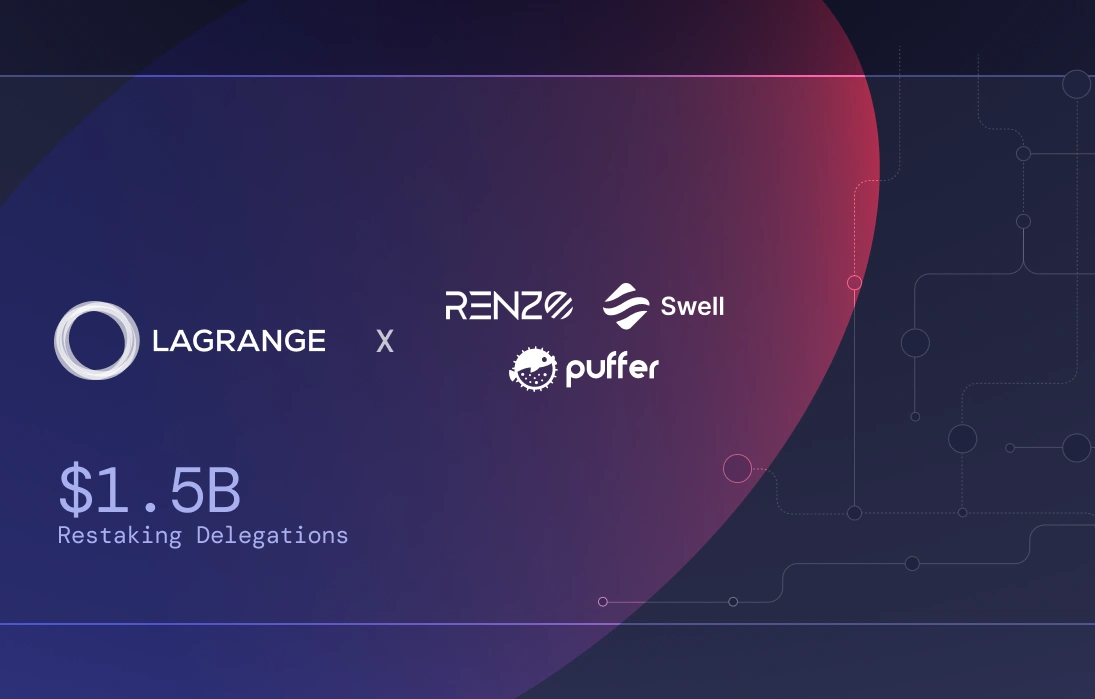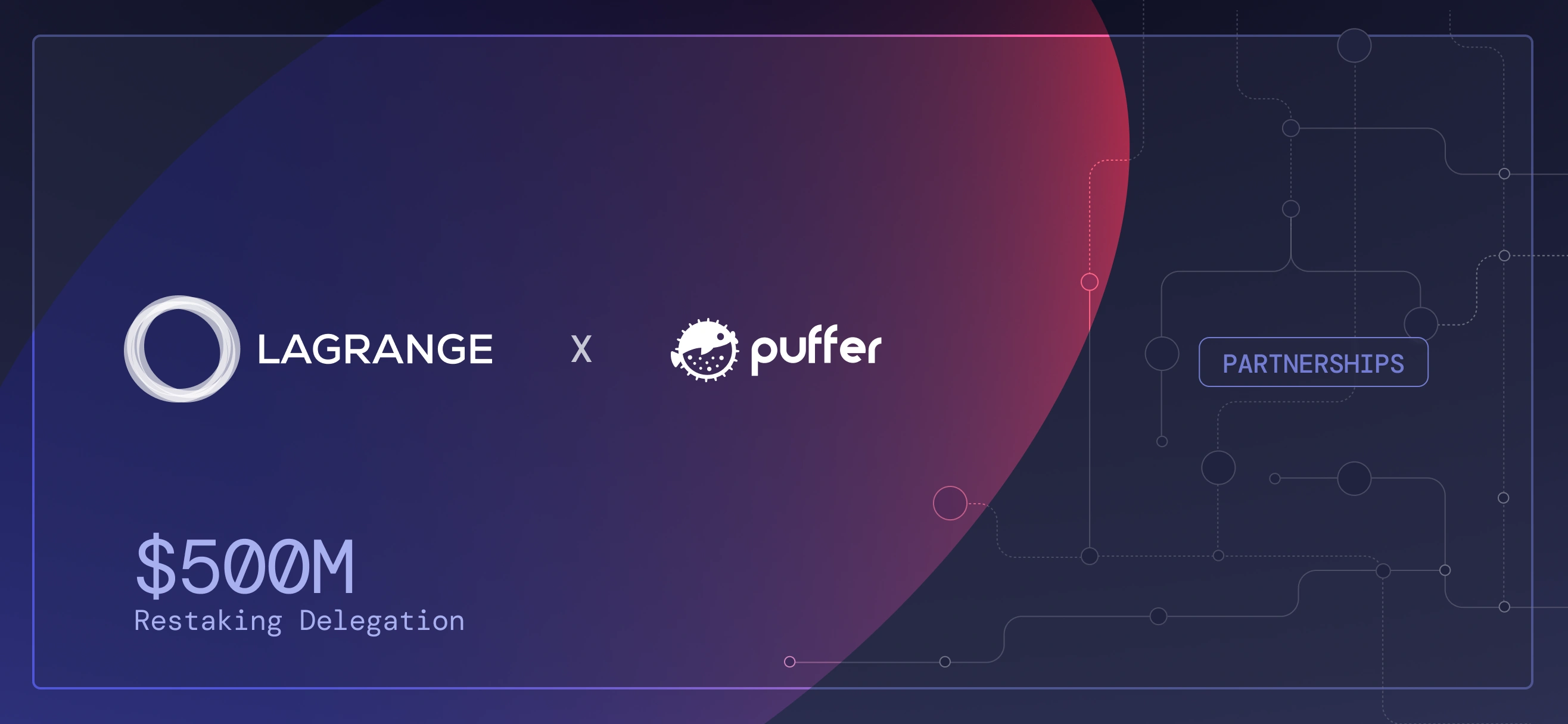Lagrange Labs Secures $1.5 Billion More in Restaking Commitments To Expand its Parallel ZK Coprocessing
March 26, 2024

Lagrange Labs has reached agreements with three separate liquid restaking protocols, Renzo, Swell and Puffer, who will delegate a total of $1.5 billion in natively restaked ETH to operators of Lagrange’s parallel ZK coprocessor.
Under the delegation agreements, each of the three LRT protocols will independently delegate up to $500mm in restaked ETH to operators of their choice within Lagrange’s network of provers. The restaked ETH will act to protect against liveness failures or faults caused by malicious operators within the network.
As part of the agreements, Renzo, Swell and Puffer have each also committed to using Lagrange’s ZK coprocessor as part of their core protocol infrastructure. With this step, Lagrange’s network will both be receiving delegations from each LRT protocol and will reciprocally be contributing to each protocol’s security.
With this announcement, the four largest LRT protocols, Renzo, Swell, Puffer and Ether.fi, have now each committed to integrating ZK proofs from Lagrange’s network to enhance the security of their core protocol. In addition, the total restaking delegations committed to Lagrange’s network from the four protocols now exceeds $2 billion.
What is Lagrange’s Parallel Coprocessor?
Lagrange’s parallel ZK coprocessor is designed to enable developers to execute intensive offchain computation and prove the result of the computation to smart contracts onchain. Rather than being constrained by onchain gas limits, developers can lift computationally intensive workloads, such as queries over historical data, to an offchain prover that will compute the result asynchronously. The prover will then submit the result of the computation and a proof to a contract onchain, allowing the dApp to verify the integrity of the result. This means that developers can rely on the proof of the computation without ever having to trust the offchain prover to give them the correct result.
Lagrange’s ZK coprocessor is naturally parallelizable and horizontally scalable. Therefore, Lagrange’s coprocessor is capable of proving large scale distributed computation over onchain storage, receipt or transaction data with ease. Each proof asserts both the inclusion of an arbitrary number of onchain data points and the result of a SQL or MapReduce computation executed on the data.
Rather than facing the limitations of sequential-style proving, Lagrange coprocessor’s proving workloads can be distributed across thousands of workers simultaneously, secured on EigenLayer through restaking. As such, Lagrange’s coprocessor can horizontally scale across arbitrary numbers of restaked operators through both parallel computation and parallel proof generation. With Renzo’s, Swell’s and Puffer’s commitments, the liveness of Lagrange’s proof generation will be secured by up to an additional $1.5 billion in restaked ETH.
How will Each LRT Protocol Use Proofs From Lagrange’s ZK Coprocessor?
Renzo:

Lagrange and Renzo will partner to integrate Lagrange’s ZK coprocessor into the protocol design for point issuance and liquidity incentives. Currently, Renzo users receive ezPoints based on the duration of time that they hold ezETH. The computation for points distribution is entirely done offchain due to limitations in access to historical storage state from within an onchain contract. With our ZK coprocessor, eZETH point issuance can be done instead entirely permissionlessly and verifiably onchain. In this design, a user can claim a reward if they present a proof that demonstrates the consecutive number of hours that they’ve held a balance of ezETH. This prevents a single protocol actor from having to be solely responsible for reward distribution.
More sophisticated DEX LP incentives can be constructed entirely onchain with the same design. For example, a user can present a proof to a rewards contract that they’ve supplied liquidity to the ezETH/WETH 50/50 Balancer Pool or to the PT-ezETH/SY Pendle Pool, in order to receive boosted ezPoints. Both Lagrange and Renzo are committed to exploring using the ZK coprocessor to further decentralize how onchain points and rewards are issued within the protocol.
Swell:

Lagrange and Swell will be pursuing three main use cases for integrating ZK technology into Swell’s protocol design. Swell’s rswETH is a repricing token that represents a user’s yield-bearing ETH that is being used by validators as part of Ethereum consensus and across supported AVSs. Currently rswETH is repriced daily based on accrued rewards, using a Chainlink oracle. While this is currently secure, it creates a dependency on Chainlink to provide correct data on a daily basis.
With EIP-4788, developers will be able to directly access the Beacon Chain root in the Ethereum execution client. As such, repricing updates for rswETH can occur entirely in ZK, using Lagrange’s coprocessor, without needing an offchain dependency on an oracle. Swell will explore replacing or augmenting its Chainlink oracle with ZK-based repricing from Lagrange’s coprocessor.
Beyond simply repricing based on Beacon Chain rewards, Swell and Lagrange will also explore using a ZK coprocessor to reprice the rswETH LRT based on AVS Rewards. Once EigenLayer enables payments and slashing, repricing will also need to be done daily based on AVS rewards. Both Lagrange and Swell expect ZK coprocessing to become an essential tool for verifiable and trustless repricing based on emitted AVS reward events.
Finally, both Lagrange and Swell are committed to deploying Lagrange’s ZK coprocessor on Swell L2 in order to offer new utility to ecosystem developers. Swell’s L2 will offer native restaking yield through using rswETH as its gas token. By deploying Lagrange’s ZK coprocessor on Swell’s L2, developers will be able to build new data-rich dApps on top of the L2s native yield.
Puffer:

Lagrange and Puffer are committed to using ZK coprocessing to replace the Beacon Chain oracle used for computing consensus validator stakes and rewards. Similar to the above use case with Swell, this design enables consensus validator positions to be trustlessly accessed from within the execution client, without requiring a dependency on an offchain oracle.
Both Lagrange and Puffer will also explore using Lagrange’s ZK coprocessor to compute $pufETH point distribution or other incentive programs for Puffer protocol participants. These incentives can be further extended to include DEX LP incentives for the $pufETH token. Finally, Lagrange has agreed to deploy its ZK coprocessor on Puffer’s L2 to enable new functionality for developers in the Puffer ecosystem.
Lagrange Labs is committed to combining restaked security with its cryptographic primitives to offer a spectrum of products to improve how blockchain state can be trustlessly consumed onchain and between chains. The operators of Lagrange’s AVS are unaffiliated with Lagrange and operate independently of Lagrange. With these agreements, Lagrange’s network now becomes the first ZK coprocessor to have more than $2 billion in restaking delegations commitments and to be used to secure four major LRT protocols.






